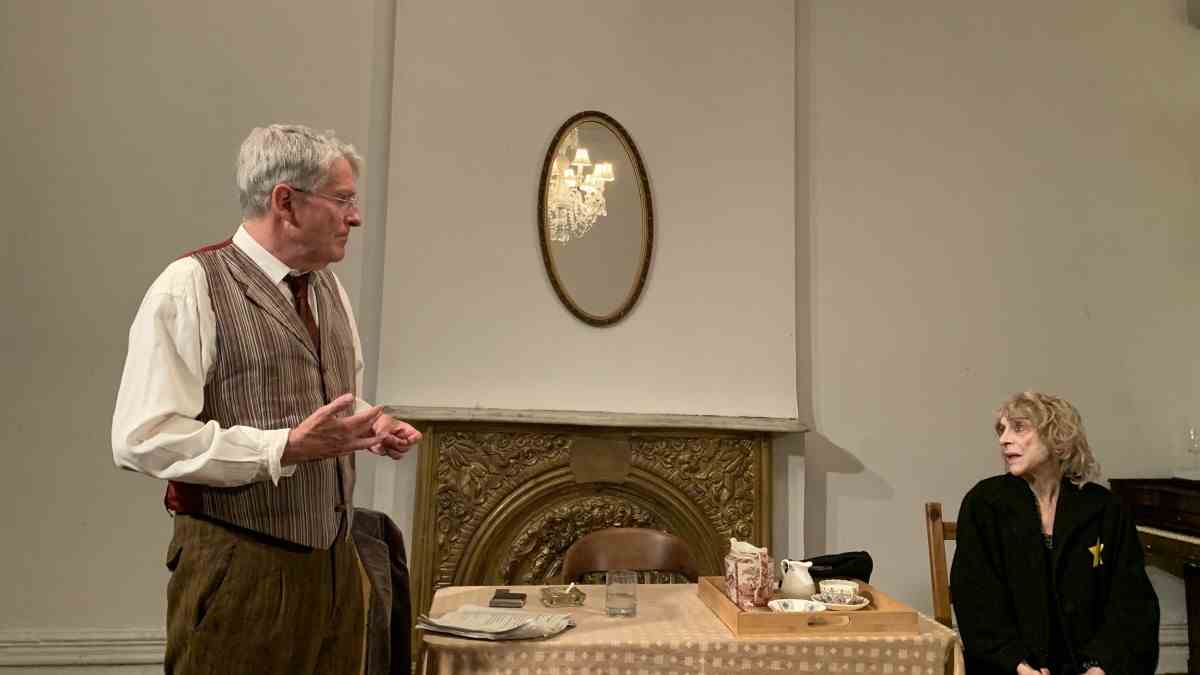Plays performed in living rooms are always an experience. Now Thomas Bockelmann, the longtime artistic director of the Staatstheater Kassel, has succeeded in bringing George Tabori’s play “Mother’s Courage” to a performance in a Manhattan house that belonged to Hollywood actors Rip Torn and Geraldine Page. Both dead, but their son Tony Torn had offered to make the house available for the performances.
Geraldine Page has won an Oscar and two Golden Globes, among others, Rip Torn was nominated for an Oscar and is probably best known for his roles in the “Larry Sanders Show” and in the “Men in Black” films.
Bockelmann has performed this two-person play around 150 times in Germany over the past two decades. He is now performing it in English for the first time in New York and has partnered with Laura Esterman, who plays Tabori’s mother. That was courageous, on the one hand because Bockelmann plays in English as a German, on the other hand because Esterman can not only fill a living room with her presence, but also Madison Square Garden. She’s the kind of actress you look at even when she’s not speaking.
The play is about how Tabori’s mother Elsa miraculously escapes from the Nazis, even though she is already on her way to Auschwitz. And it’s also about how so many others didn’t escape. According to her son, Elsa Tabori told an SS officer that she shouldn’t be part of this transport because she had a Red Cross passport. However, she doesn’t have it with her right now. Unbelievable? Absolutely. But it was thanks to her courage and her blue eyes that the SS man let her go.
Almost 25 spectators fit in the room in the Torn residence. The idea is that it is Elsa Tabori’s living room in Budapest, where her son is now sitting, a few years after her death, writing down her story. He reads from it, and the dead mother appears and comments on what he has read.
Bockelmann and Esterman didn’t have much time to rehearse, which isn’t a problem given that Bockelmann has been playing the piece for twenty years and has an agreement with Esterman that she can interrupt him whenever she wants, so they play less to the timetable than after Feeling.
Esterman’s timing was so good at the premiere that Bockelmann probably also lost his breath at times. It can be difficult or liberating to act on stage with someone who knows the art of acting that quirk better; for Bockelmann it was rather inspirational. It took him a while to get used to the English version of the play, but thanks to Esterman he was getting better at it.
There was no Hungarian goulash and wine because of Corona – sigh
Originally it was said that Tony Torn would come up with a Hungarian goulash after the performance, and Bockelmann, it was also said, would choose a Hungarian wine. Of course, the audience didn’t come (only) because of this prospect, but when it was announced at the beginning of the performance that goulash and wine would be canceled due to rising Covid numbers in New York, a quiet, collective sigh was heard in the auditorium.
Instead of goulash and wine, there was a round of speeches with the actors after the performance. Juliane Camfield, head of the German House at New York University (it is actually called “Deutsches Haus” and not German House) moderated, and when only Bockelmann and Esterman were each handed a glass of white wine at the beginning of this round, she said, aptly: “And me?”
With mind wandering even in the living room theater, one briefly wondered how Geraldine Page and Rip Torn would have performed the play, right here, in their own home. But that thought came and went, it’s irrelevant, a gimmick, and instead there was this idea: The play works on the big stage and it works on the screen, German director Michael Verhoeven did it in 1994 with George Tabori and Pauline Collins filmed in the leading roles, Ulrich Tukur played the SS man who saves Elsa Tabori’s life.
But maybe it actually works best in a living room, close and close, and now that Bockelmann has found the great Esterman, wouldn’t it perhaps be a good idea to bring the piece back – yes, in English – to that special closeness and closeness not of a New Yorker, but of a German living room?

